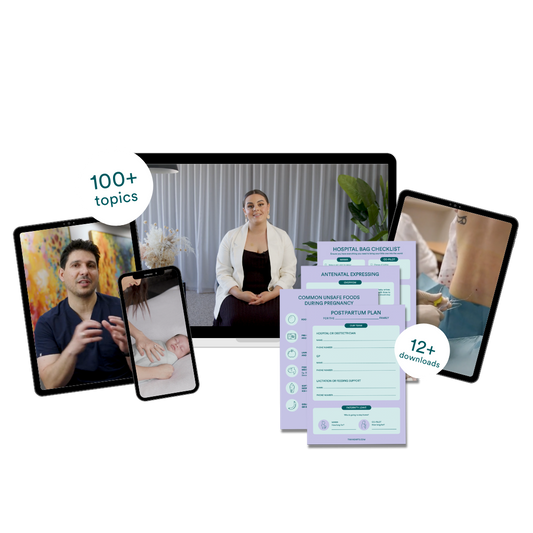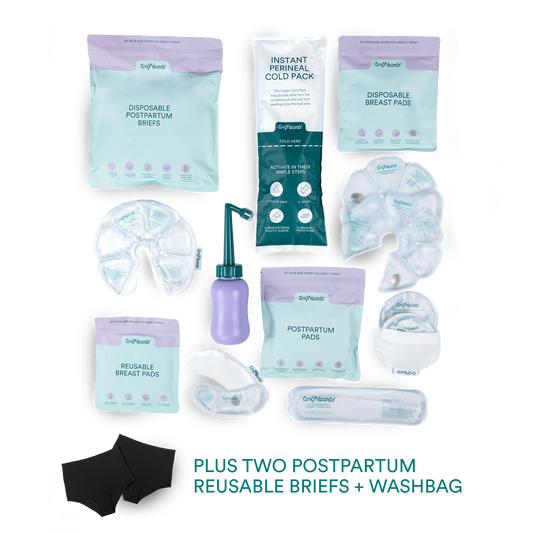WHAT IS RSV?
RSV is a virus that affects the respiratory system. It's very common, especially in winter, and is actually the most common cause of respiratory + breathing infections in little ones. Kids and babies are particularly susceptible to RSV, with it being a major cause of bronchiolitis and pneumonia in this age group. The only way to know for sure that bub has RSV is a nasal swab, which may be performed at a GP clinic or hospital.WHO IS AT RISK OF RSV?
Anyone and everyone can catch RSV, multiple times. As I said above, little ones are more likely to experience RSV and get quite unwell from it. Bubs who were born premmie or at a low birth weight are at more risk, as well as those with chronic lung disease, asthma or weakened immunity. The worst part? RSV can be caught over and over again.SYMPTOMS OF RSV
Bubs who catch RSV almost always show symptoms, unlike adults who may not know they're carrying it. Symptoms usually begin around 5 days after being exposed. RSV usually starts as an innocent sniffle but for bubs under 1 it can quickly turn nasty. Signs your little love may have RSV usually last around 1-2 weeks but may include:
- Coughing
- Wheezing
- Fever
- Runny nose
- Sore throat
- Headache
PREVENTING RSV
- If there's anything we've learnt from living in a pandemic over the last few years, it's to keep washing your little one's hands frequently [and yours too].- Cough or sneeze into your elbow and encourage your little one to do the same.
- Limit bub's exposure to crowds and anyone with a cold, regardless of how mild it seems.
- Educate your loved ones about the dangers of kissing a baby.
- Don't let your little one share drinks, cutlery or toys.
- If you've got multiple little ones in your house and they do share toys, give them a good clean frequently.
- Stay home if you or bub are unwell.
THE 'NO KISSING' RULE
A 'no kissing rule' is exactly that; no one kisses your baby, except for you + your partner. RSV, and many other illnesses/ infections can be spread easily from person to person and, more importantly, from adult to baby. This is why we encourage you to set some boundaries with family and friends with the 'no kissing rule'. Adults can carry RSV and not even know they have it, which is part of the reason why we need to normalise not kissing our vulnerable little people.MANAGING RSV IN YOUR LITTLE ONE
If your little one becomes unwell with RSV, there are a few things you can do to help, and they mainly focus on comfort, hydration + monitoring:- Rest. Encourage sleep, quiet time and lots of snuggles. Don't be afraid to let go of routine and tune in to whatever your little person needs to heal.
- Encourage the fluids. Your little one may be off their food which is ok when they're unwell. The most important thing is fluids + their hydration, so encourage regular breast/ formula feeds and water or oral rehydration solution if bub is over 6m. Keep in mind there are many flavours, and the oral rehydration comes in liquid, powder mix and icy pole form.
- Snuggles, snuggles + more snuggles.
- If bub is up for eating, offer foods rich in fluids like soup, watermelon, cucumber, yogurt, custard and peaches.
- Monitor for dehydration symptoms, such as decreased wet nappies, darker coloured or smellier urine, dry mouth, sunken fontanelle, crying with no tears, lethargy, dizziness + irritability.
- Offer Paracetamol or ibuprofen if your little one is miserable or uncomfortable. Use saline drops in bubs nose to help relieve congestion [see our socials for a DIY saline drop recipe we shared recently].
- Little ones that end up in hospital with RSV [around 2% of little ones] will need help with their breathing, often oxygen therapy and sometimes treatment in ICU.
- If your little one has asthma, RSV is likely to trigger their asthma symptoms, so watch them closely for the onset of any asthma symptoms and act according to their asthma action plan.
- Continue to monitor bub + escalate any red flag symptoms by getting bub medical attention.
WHY WON'T ANTIBIOTICS HELP MY LITTLE ONE RECOVER FROM RSV?
Antibiotics treat bacteria [not viruses]. We have billions of bacteria all over and inside our bodies that reproduce and grow, most of them being harmless and even essential for our health, but sometimes they can cause infections. Antibiotics slow the growth of bacteria or kill them by destroying the cell walls.Viruses behave differently. These tough little guys don't actually have a cell wall that can be fought off with antibiotics, and instead, they invade our cells and sneakily set up shop inside them! They can't reproduce on their own but instead reprogram the body's cells to make new viruses. For these reasons, antibiotics won't do a thing to rid an infection caused by a virus.
It's important not to self-prescribe or take antibiotics' just in case' as this can cause a dangerous resistance to the drug. It may also kill off the body's much needed good bacteria, which means we can get sick more easily in the future.
The exception to this may be if bub goes on to develop an infection after being unwell with RSV, such as an ear infection, pneumonia or bronchiolitis. In these cases, bub's doctor will provide more advice.
RED FLAGS
If you see any of the following, it's so important to get bub medically assessed. Whether you take bub to a GP, up to ED or call 000 is dependent on their symptoms and the severity of those symptoms, so follow your instinct and the guidance of bub's medical professionals.- Difficulty breathing [respiratory distress]
- Lethargy, drowsiness or difficulty waking bub up
- A rash that doesn't fade when you press on it,
- Aged 3m or younger with a fever of 38 degrees or above
- Signs of dehydration
- Irritability or unexplained pain that isn't resolving
- Bub's skin is pale, blotchy or blue
- Refusing to breastfeed or drink formula for bubs under 1, refusing to drink any fluids, including water for bubs over 1, or are unable to keep fluids down
- Bub has a seizure or febrile convulsion
- Bub has a fever for more than 48 hours, or it's not responding to paracetamol + ibuprofen
- You're concerned
In addition to the normal RSV this year, we've also got Covid going on alongside a big increase in the usual number of Influenza A cases we see too. What do these all have in common? They are viruses that all affect the respiratory system and can cause respiratory distress. Let's look at respiratory distress a bit closer.
RESPIRATORY DISTRESS
When our bubs are having a hard time breathing, their little bodies will do certain things to try and improve their oxygen levels. To know when bub is working harder to breathe, you need to know what their breathing looks like when they are happy and healthy. So when your bub is settled, lay them down, remove any clothes to expose their chest and record a 30-second video of them breathing normally. If you are ever concerned bub is working harder than normal to breathe, you can pull this video out and compare it to how bub is breathing now. Signs bub is in respiratory distress include:- Changes to skin
- Changes to rate of breathing
- Changes to conscious state
- Changes to their breathing
If you're not sure, look at their:
- Skin colour: is their skin the colour it usually is? Or is it paler or has bluish-purple tone? Is it cool or clammy?
- Conscious state: are they lethargic, confused, dazed or do they stare right through you like the lights are on, but no one is home?
- Breathing: are they breathing faster, slower or irregularly? Can you hear any unusual sounds like wheezing, crackles, stridor; a high-pitched inspiratory noise?
- Body position: have they positioned themselves with their head back, nose up in the air (sniffing position) or are they sitting bent over, trying to get as much air in as possible?
- Physical signs: are their nostrils flaring out with each breath? Is their head bobbing up and down as they breathe? Are they sucking in around the collarbone, at the base of the throat, under the ribs, at the bottom of the chest? Can you tell they are using extra muscles and effort to help get air in and out?
All of these are signs of reparatory distress in little ones. These signs may range from mild to moderate or severe. No matter how bad, you should always seek medical attention. The more signs that your child has and the bigger effort to breathe, the greater respiratory distress they are in. If bub is in severe respiratory distress or you're ever unsure, call 000.
RECESSIONS/ RETRACTIONS
We often get questions about recessions/ retractions and what it means, so let's clear that up. These two words mean the same thing; the words are just used interchangeably.Recessions/ retractions are when there is sucking in of the skin around the muscles we use to breathe. You might see it:
- In between the ribs [known as intercostal recessions]
- At the bottom of the ribs [known as subcostal recessions]
- At the bottom of the chest [known as substernal recessions]
- At the base of the throat [known as a tracheal tug]
If bub has recessions, it means they're working harder than normal to breathe and are using accessory muscles to try and compensate for whatever is causing them to not be able to breathe properly. While it may help them cope for a little while, it's not sustainable long term, and bub will tire, so if you notice your little one has recessions, they need medical attention.
I hope this blog helps prepare you for RSV and identifying respiratory distress in your little one this winter. Leave any questions + tag your loved ones with little ones in the original post on Facebook or Instagram and let me know in the comments; what was your experience with a little one catching RSV?
Helping you feel prepared for parenthood is what Tiny Hearts is all about. Book into our baby + child first aid class, and let us empower you to face parenthood without fear. 💗








